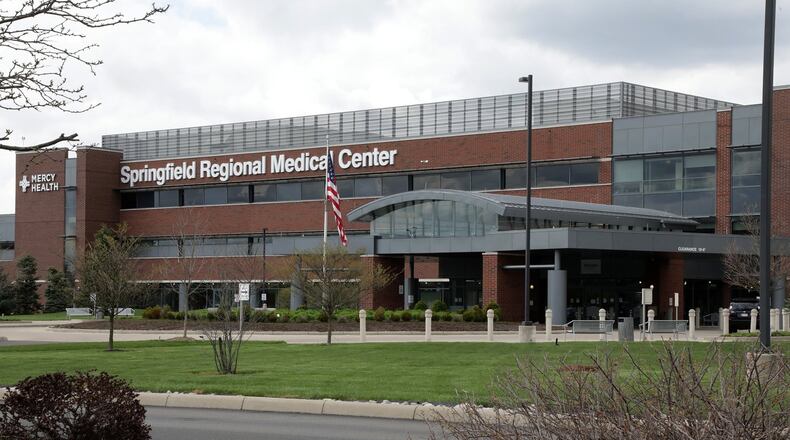Throughout April, there was a 42% drop in those requesting cardiovascular related services, a 64% drop in cancer patients, a 35% drop in general medicine patients and a 46% drop in neuroscience related services when compared to the previous year.
Representatives of Mercy Health said that pertains to only patients who were admitted to emergency departments at two of its hospitals in the area, Springfield Regional and the Urbana Hospital.
MORE: Yellow Springs first Ohio community to require masks by law
However, the severity of illness reported on average for those patients was higher, Groshans added. That data does not include patients at the Mercy Health Dayton Springfield Emergency Center near Enon.
Groshans said the decrease seen could be because patients were delaying care due to concerns related to the coronavirus pandemic. He said that can cause more severe symptoms and is not a phenomenon that is exclusive to the greater Springfield area.
“When you start to see a strong decline in those numbers, it can be concerning. Those events are still happening and the safest way to manage them is at an acute care facility,” he said, noting that patients who may have delayed care during April and May are starting to seek care.
It is also not something just associated with emergency care as delays can also impact the health of those receiving long-term care or regularly scheduled appointments.
In response, hospital officials have stressed that there facilities are safe to treat patients amid the global health crisis.
For Mercy Health, that means increasing the amount of personal protective equipment that staff is required to wear, implementing additional screening services for patients and staff as well as limiting visitors coming to the hospital and expanding virtual health offerings.
There was an overall decline in patient services in March and April as the community grappled with the onset of the coronavirus pandemic. The state suspended all elective procedures in March in an effort to preserve personal protective equipment.
However, the state has since allowed those procedures to resume as hospitals in Ohio have started to offer outpatient elective surgeries again as well as overnight procedures.
Since those services started coming back in May, Mercy Health has reported that current patient volumes are at about 80% in the area when compared to the same period last year. Groshans noted that is for all services related to Mercy Health providers in the Springfield market, which primarily consists of Clark and Champaign counties.
In terms of emergency services, that number is at around 85% when comparing volumes during the second week of June to the same period last year, he added.
In addition, representatives of Mercy Health added that the hospital network has been working with local public health officials and have been strictly following state guidelines as well as those from the Centers for Disease Control and Prevention in terms of managing the pandemic.
MORE: Coronavirus: Is your zip code part of ‘worrisome’ increase in cases?
A workplace outbreak was reported at Springfield Regional and 15 employees at the hospital tested positive for the coronavirus this month. As of last week, none of the employees were hospitalized and all employees who had tested positive were not working and were home isolating.
“Mercy Health has a highly detailed, robust, multi-step process for ensuring associate and patient safety,” said Nanette Bentley, with Mercy Health, in an email to the News-Sun.
“From an employee perspective this includes but is not limited to screening, temperature taking, testing if symptomatic, quarantining, retesting as needed, travel restrictions and extensive return to work criteria for associates who test positive or are symptomatic,” she added.
In addition, representatives of Mercy Health say they are in a better position now than they were in March to handle the coronavirus pandemic in the Springfield Market.
Groshans said that PPE is more accessible and that they have implemented best practices in terms of reusing certain supplies. He also mentioned that testing capabilities and opportunities have increased in the region.
About the Author
